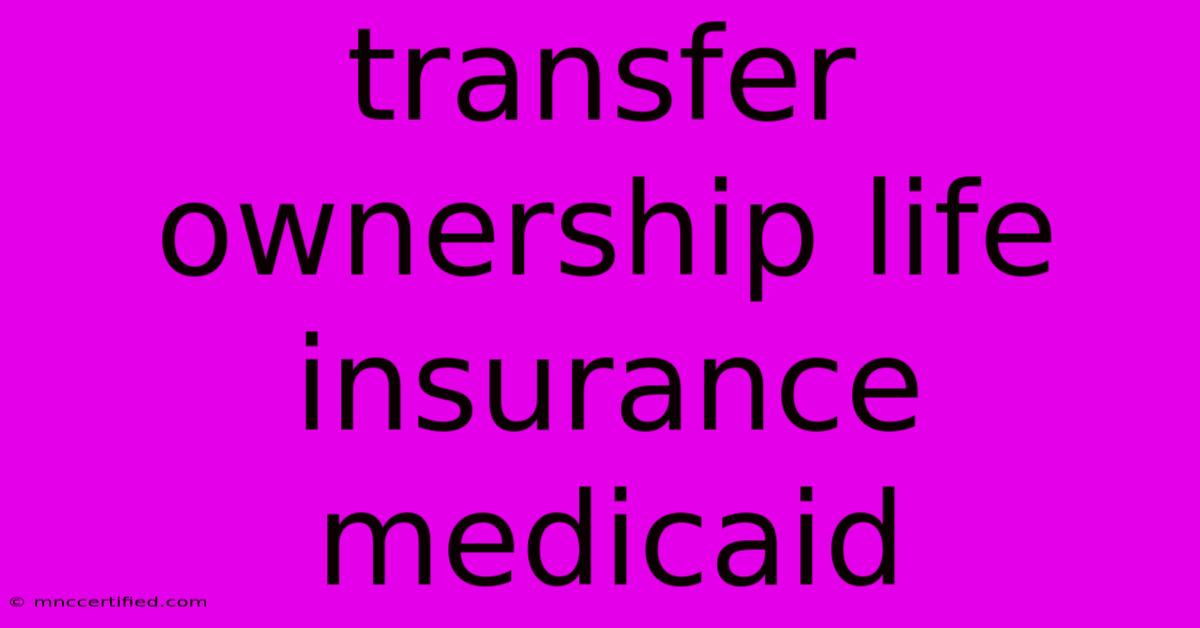Transfer Ownership Life Insurance Medicaid

Table of Contents
Transferring Ownership of Life Insurance: Can It Help You Qualify for Medicaid?
Planning for the future is essential, and that includes ensuring your loved ones are financially secure after you're gone. Life insurance can play a crucial role in this, but what happens if you need Medicaid assistance in your later years? Can transferring ownership of your life insurance policy affect your eligibility?
Understanding Medicaid and Life Insurance
Medicaid is a government-funded program that provides health insurance to low-income individuals and families. It's a vital safety net, covering a wide range of medical expenses, including long-term care.
Life insurance policies, on the other hand, are designed to provide a death benefit to your beneficiaries upon your passing. This money can be used to cover funeral expenses, debt, or other financial obligations.
The Complex Relationship Between Medicaid and Life Insurance
While both programs serve different purposes, they can sometimes intersect. Medicaid has specific rules regarding assets, and life insurance policies are often considered assets. This means transferring ownership of your policy could potentially impact your eligibility for Medicaid benefits.
How Transferring Ownership Can Impact Medicaid Eligibility
The rules surrounding Medicaid and life insurance are complex and vary from state to state. In general, transferring ownership of a life insurance policy can be viewed as an attempt to "hide" assets from Medicaid, leading to a denial of benefits.
Here are some key considerations:
- Transferring ownership within 5 years of applying for Medicaid: This can trigger a "look-back period" where Medicaid officials review your financial history. If they find that you transferred assets within this timeframe, they may consider it a "disposal" to become eligible for benefits and deny your application.
- The beneficiary of the policy: If you transfer ownership to a beneficiary who is not a spouse or dependent child, Medicaid may see this as an attempt to transfer assets away from yourself.
- The death benefit: Medicaid may consider the death benefit as an asset you control, potentially affecting your eligibility.
What to do if you're considering transferring ownership of your life insurance policy:
- Consult with an experienced elder law attorney: They can provide personalized advice on how transferring ownership might affect your eligibility for Medicaid in your specific situation.
- Consider other options: You may explore alternative strategies like setting up a trust or gifting the policy to a family member to minimize the impact on your Medicaid eligibility.
- Understand state-specific rules: Medicaid regulations vary across states. Seek guidance from a qualified attorney to navigate the complexities within your specific state.
Important Note: This information is intended for general knowledge and informational purposes only and does not constitute legal advice. It is essential to consult with a qualified attorney to obtain advice tailored to your specific circumstances.
Conclusion
Transferring ownership of your life insurance policy can be a complicated issue when it comes to Medicaid eligibility. It's crucial to understand the potential consequences before taking any action. By consulting with an expert and considering all available options, you can ensure your financial planning aligns with your long-term care needs and doesn't jeopardize your eligibility for essential Medicaid benefits.

Thank you for visiting our website wich cover about Transfer Ownership Life Insurance Medicaid. We hope the information provided has been useful to you. Feel free to contact us if you have any questions or need further assistance. See you next time and dont miss to bookmark.
Featured Posts
-
Smiths Federal Cases End In Sight
Nov 07, 2024
-
Using Va Home Loan For Investment Property
Nov 07, 2024
-
Elon Musks Potential Gains Under Trump
Nov 07, 2024
-
When Is Trumps 2025 Inauguration
Nov 07, 2024
-
Is A Septorhinoplasty Covered By Insurance
Nov 07, 2024